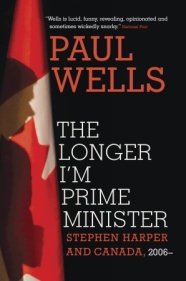I’ll save you the trouble of reading the rest of this book review – if you like Paul Wells’ writing style, and you liked Right Side Up, then go out and buy “The Longer I’m Prime Minister” now. Because you’re certain to find that book more interesting than the rest of this blog post.
For those of you still with me, it’s best to think of this book as Episode II of the Paul Wells Stephen Harper trilogy (or maybe Episode V, if there are plans for a few boring prequels about life at the National Citizens Coalition). In Right Side Up, we saw the rise of Harper. In The Longer I’m Prime Minister, we get a look at how Harper governs. Time will tell how long we’ll need to wait for the fall of Harper, but this book provides valuable insights into how he has made it this far.
Much of his success has, no doubt, been due to lackluster opponents, on whom Wells is merciless (e.g. “the owlish and intermittently comprehensible Dion”). But Wells shares the opinion, to which I also subscribe, that Harper has been underestimated by too many people for far too long. This isn’t a case of Mr. Magoo stumbling out of trouble – Harper owes his success to meticulous planning and discipline.
Take for example, Harper’s governing style. Wells paints a picture of a leader wanting to avoid the tragic flaws that claimed his predecessors. So after watching Lucien Bouchard and Paul Martin undo successful Prime Ministers, Harper has been careful to ensure no minister’s clout grows to the point where he becomes irreplaceable. After seeing Mulroney slain by Meech and Charlottetown, Harper learned not to chase dragons.
So there’s a method to his monotony. Harper intentionally dulls his speeches so that quotable lines pop. Moreover, by being formless, he becomes harder to hate and easier to project ourselves onto.
Most of this is Wells’ analysis, built by interviews with backroom conservatives. There are few on-the-record quotes and, as a result, no bombshells about the Harper years. We don’t learn a lot about Harper the person – only Harper the Prime Minister. However, the book serves as a nice stroll down memory lane, from Lawrence Cannon’s bafflegab on Quebec as a nation, to Michael Ignatieff putting the Tories on probation, to the case of “Liberal zombie spy” Linda Keen.
This refresher course on the Harper years is enjoyable – and relevant in light of recent the Nigel Wright controversy. Most will remember the Chuck Cadman affair, when Conservative operatives allegedly offered the dying MP a life insurance policy, in exchange for his vote. Even more interesting is the largely forgotten case of Alan Riddell, who was offered $50,000 to step aside in favour of another candidate. Sound familiar?
I’m sure there will be more about Nigel Wright in Epsidosde III but, for now, The Longer I’m Prime Minister provides an enjoyable overviw of the Harper years and sheds some light on why the man we all love to underestimate has been so succesful.
A copy of this book was provided by Random House for review.
